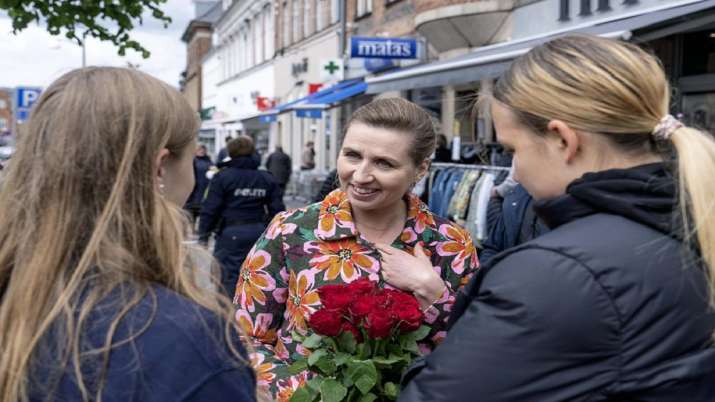
Danish Prime Minister Mette Fredriksson, center, speaks to people during an election campaign in Holbeck, Denmark, on Saturday.
Historically skeptical about the EU’s efforts to deepen cooperation, Danish voters will choose on Wednesday whether to abandon the country’s decision three decades ago to pull out of the bloc’s common defense policy. The Danish referendum comes as the latest example of European countries seeking closer defense ties with allies in response to Russia’s invasion of Ukraine. It follows historic bids from Sweden and Finland to join NATO – something that is to be taken up at a summit next month.
Denmark joining the EU’s defense policy would have a relatively minor impact on Europe’s security architecture, especially compared to Sweden and Finland joining NATO. But Christine Nissen, a researcher at the Danish Institute for International Studies, said the two moves are “part of the same story” and will strengthen military cooperation on the war-torn continent in Ukraine.
She said the main effect of leaving the opt-out decision would be that Danish officials could be in the room when EU allies discuss defense topics and that Danish forces could participate in the bloc’s military operations. Denmark, a founding member of NATO, has remained aloof from the EU’s efforts to create a common security and defense policy parallel to the Trans-Atlantic Alliance. The Danes insisted on one of four opt-out steps before the EU’s adoption of the Maastricht Treaty, which laid the foundation for a political and economic union.
The 1992 exemption meant that Denmark did not participate in EU discussions on defense policy, its development and acquisition of military capabilities, and joint military operations in Africa and Bosnia and Herzegovina. The Danes also opted out of EU cooperation on justice and home affairs, common currency and citizenship. The opt-out decision on citizenship, which stated that European citizenship would not replace national citizenship, has since become irrelevant as other members later adopted the same position. But other provisions remain intact despite successive governments trying to overturn them.
In the 2000 referendum, Danish voters decided to stay out of the eurozone, and 15 years later they voted to keep an exemption on justice and home affairs. This time, however, the Danes appear ready to say goodbye to the exit from the common defence. Social Democratic Prime Minister Mette Frederiksen called for a referendum on 8 March, less than two weeks after Russia launched an invasion of Ukraine on 24 February. He called on citizens to vote “yes” to eliminate the exception, asking them to do so. Strengthen our security.”
“I’m voting in favor of eliminating the opt-out,” said Peter Jacobsen, a 61-year-old pharmacist in Copenhagen. “We must not stand out. We are in the European Union and we must join. We must make a difference.”
Read also | Queen Margaret II of Denmark warmly welcomes PM Modi in Copenhagen
Read also | ‘You really know how to welcome a politician, please teach…’: Danish PM to Indians